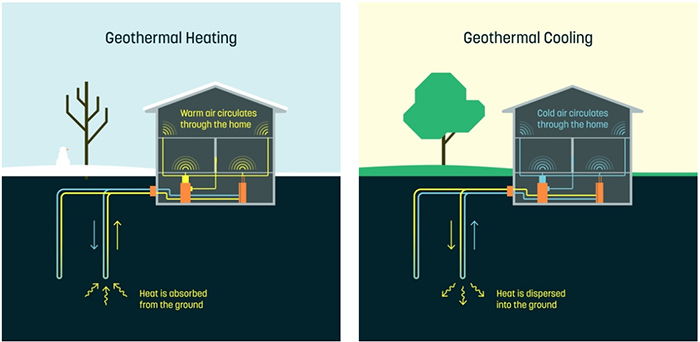You can use warmth trapped within the earths crust to heat your house. Installers bury pipes underground, then fill those pipes with water. The water absorbs the earth's heat, warms up and can then be pumped — as warm air — into your house.
Should Dandelion Spread to More Areas than Upstate New York?
Emily Folk | Conservation Folks
Green energy is one of the most optimistic burgeoning markets in the US. The earth has a plethora of resources to offer, many of which immediately replenish and do nothing to harm the environment. Every year more homes are outfitting with sleek new solar panels and personal turbines.
Geothermal, another option which has widely flown under the radar, is now sponsored by a Google spinoff — Dandelion. The company has been reducing the ordinarily pricey installation for some homes in upstate New York. But we should also consider if this company can expand its reach to other parts of the state and country as well as whether or not it should.
Geothermal
You can use warmth trapped within the earth’s crust to heat your house. Installers bury pipes underground, then fill those pipes with water. The water absorbs the earth's heat, warms up and can then be pumped — as warm air — into your house. During the summer the same pump mechanism pushes warm air out of your home and back onto the earth, cooling things off.

The whole procedure is fairly noninvasive after the initial drillings as well as sustainable. It is, however, expensive for the drilling and installation. Installation estimates prior to Dandelion racked up to $60k, and many households are presently unable to afford geothermal options. Dandelion seems to cut the prices and minimize the invasiveness of the drilling. Standard installation costs between $20,000 and $25,000.
Assessing Dandelion
As previously stated, Dandelion seems to make things cheaper and less invasive than standard geothermal rigs. Where custom and professional jobs bore large holes or artesian wells in the backyard, Dandelion’s method uses much smaller pipes — typically a couple inches wide — cutting back on the material waste and yard damage.
Despite all this, there are still some considerations potential buyers will want to take into account.
Dandelion is New
The company started operating in July of this year. Given the recency, it is impossible to know of potential complications years down the line. We know Dandelion has pioneered a new drilling method, and it seems to work well. However, without data from even the first winter or spring in the field, it is premature to declare success. Whenever a procedure slashes costs, scrutiny should follow.
Another concern is the sample size and limited locations of field tests. Dandelion has only begun operations in a very limited and unique area. The local temperature in Ithaca is bound to be different from that of Charlotte. While this may not disturb the operations of the heat pump, it may skew costs for heating or cooling away from initial estimates.
Further, other subterranean concerns may come into play — tectonic activity, for instance. Upstate New York is rarely hit with earthquakes, but California may not be so lucky. In some cases, larger or sturdier pipes or wells might hold up better to subterranean activity, erosion or other environmental factors specific to an area outside of New York.
Cost
Upstate New York is widely powered by energy coming from the Niagara dam and the Eerie lochs. Availability of natural and renewable energy can keep the cost of electricity lower in Upstate New York than other regions. Dandelion estimates come to $120 a month — as previously mentioned, that is in a very select and unique location. Expect costs to be higher in other areas.
Likewise, the cost of drilling and installation could vary, depending on the soil grade. Nobody knows what Dandelion’s policy on this will be. If a flat installation rate — or range, at the very least — is implemented, this could cease as a concern. Only time will tell.
Keep the Trial Going
Dandelion chose Upstate New York as a targeted first location, likely for its favorable conditions for initial testing. It is not in Google’s — or any of its subsidiaries — best interest to start up operations in areas that will not be cost-effective or receptive to the new tech. Likewise, patience and testing are required when moving toward nationwide implementation of a new energy system.
We have every reason to remain optimistic based on current costs and reports. Dandelion will inevitably already test in other locations. There are still some long-term concerns we can’t know for a few years at least. Until that time has passed, Dandelion should continue testing in other locations and providing Upstate New York with clean energy as an extended field test for its tech.
What You Should Do
Provided Dandelion does begin offering installation in other locations over the next few years, think about the above considerations before installing. If possible, wait a few years and research complaints by the original clients in upstate New York and any local installees in your area. A failed geothermal system — whether the pipes, heat pump, or any other part — can be extremely costly and inefficient.
The content & opinions in this article are the author’s and do not necessarily represent the views of AltEnergyMag
Comments (0)
This post does not have any comments. Be the first to leave a comment below.
Featured Product

